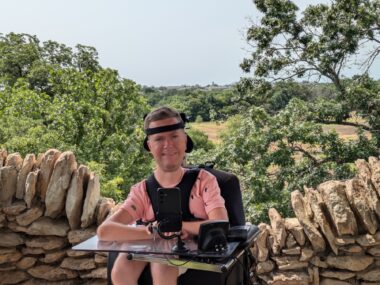SMA Europe inviting patients to talk of how treatment has changed life
OdySMA project's goal is better access to therapy and disease care for all
Written by |

SMA Europe is launching an initiative to share personal stories of how treatment affects the lives of people with spinal muscular atrophy (SMA).
The initiative comes as part of OdySMA, an SMA Europe project that tracks access to treatments and care for SMA patients across Europe, with the ultimate goal of making treatment accessible to everyone who needs it.
“Through data visualizations, the OdySMA atlas provides supporting evidence for SMA patient advocates and stakeholders who work so that ‘no one is left behind,'” the organization said in a press release sent to SMA News Today.
Treatment for SMA is often life-changing, but access can be challenging
OdySMA’s initiative showcases personal stories told by people living with SMA. In highlighting the impact treatments can have, it intends to spotlight the individuals behind the data and make the information given more personable.

Stefan, an SMA patient in the Netherlands, speaks to how treatment has changed his expectations for the future. (Courtesy of SMA Europe)
“I always pictured myself ending up on a ventilator without being able to move my hands,” said Stefan, an SMA patient in the Netherlands. “But when the treatment started, I started noticing I was becoming stable, and that would mean that I could do my job like I am doing right now for maybe the next 10 or 20 years.”
Marked by SMA symptoms of progressive muscle weakness and wasting, the neurodegenerative disease’s care changed radically in recent decades with the advent of disease-modifying therapies that can slow or even stop its progression.
Though treatments can be life-changing for people with SMA, access to them remains a challenge for too many. Patients may be denied access based on factors like age, SMA type, or having had a tracheostomy to help them breathe. Issues with insurance providers also can become obstacles in seeking treatment.
“I wish that everyone could get access to SMA medicines. Everyone,” said Nataliia, an SMA patient from Ukraine now living in the Czech Republic. “I feel that it’s unfair that we have to rely not only on money, but on governments, insurances, or medical companies to receive treatment.”
Still needed: Access to treatment for all with SMA across Europe
Access to newborn screening (programs where babies are routinely tested for SMA soon after birth) also is uneven in Europe. Newborn screening has emerged as a major priority of SMA care; since treatments can slow disease progression but cannot reverse damage that’s already done, outcomes generally are best when therapy is initiated as early as possible.
“Even in countries with good access policies in place, people living with SMA are facing hurdles to access treatment and care for SMA,” said Nicole Gusset, CEO of SMA Europe. “We paused to listen to our people. The voices are loud and clear: access is still very complex in practice. Equitable access changes lives. We need it now, throughout Europe, for all people living with SMA.”
The real-life stories are being produced through collaborative writing techniques and in-depth interviews, ensuring that each individual is represented according to their wishes. In addition to showcasing the impact of SMA treatments, these stories provide a glimpse into patients’ priorities as they navigate a complex healthcare system.
“My call for action would be for pharmaceuticals and the government to find a way to fix the system, because we do not need to fix it for SMA only, and not only for neuromuscular disorders,” said Hanneke, an SMA patient in the Netherlands. “We have 5-10,000 rare diseases that need fixing, and this way, it will not be feasible.”
SMA Europe is an umbrella organization of SMA patient organizations across the European continent. The group recently released a new documentary aiming to raise awareness about SMA research.




